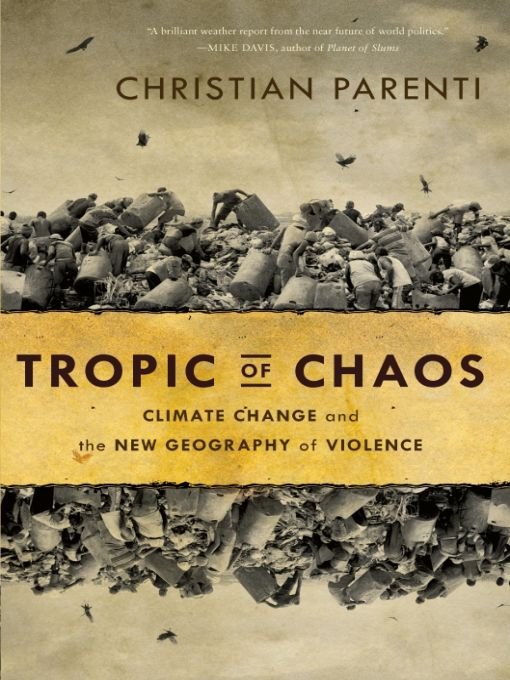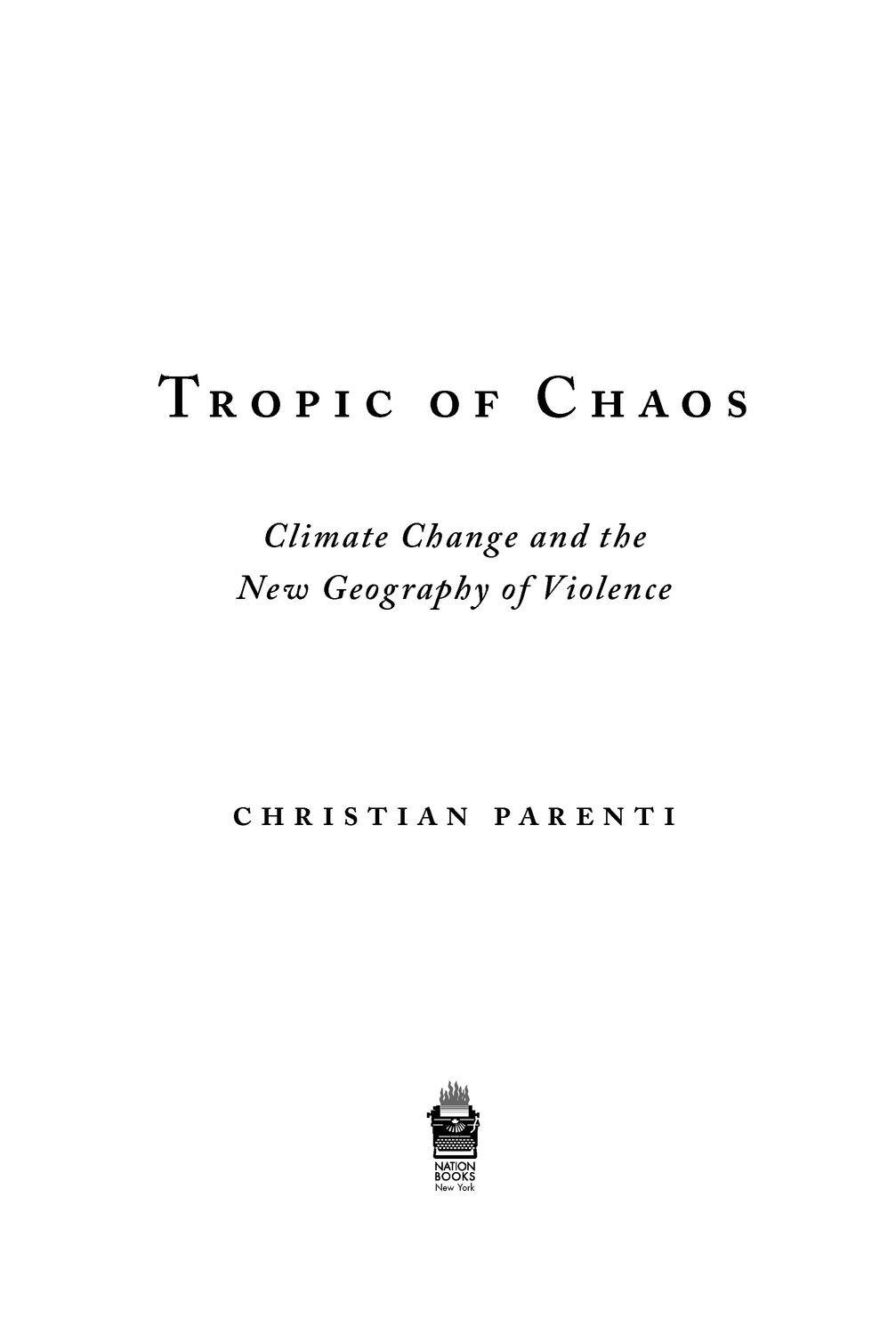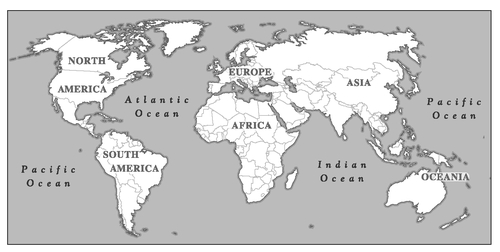Authors: Christian Parenti
Tropic of Chaos


Table of Contents
Â
Â
Â
Â
Â
Â
ALSO BY CHRISTIAN PARENTI
Lockdown America
Â
The Soft Cage
Â
The Freedom
For Juliet and her whole generation, with apologies
The pressure of the hungry and desperate billions has not yet become so great that world leaders see Kurtz's solution as the only humane, the only possible, but fundamentally sound one. But that day is not far off. I see it coming. That is why I read history.
âSVEN LINDQVISTâ
Exterminate All the Brutes
Exterminate All the Brutes
I
LAST CALL FOR ILLUSIONS

CHAPTER 1
Who Killed Ekaru Loruman?
What are the roots that clutch, what branches grow
Out of this stony rubbish? Son of man,
You cannot say, or guess, for you know only
A heap of broken images, where the sun beats,
And the dead tree gives no shelter, the cricket no relief,
And the dry stone no sound of water.
Out of this stony rubbish? Son of man,
You cannot say, or guess, for you know only
A heap of broken images, where the sun beats,
And the dead tree gives no shelter, the cricket no relief,
And the dry stone no sound of water.
âT. S. ELIOT,
The Waste Land
The Waste Land
Â
Â
Â
E
KARU LORUMAN lay beneath a flat-topped acacia tree, its latticework of branches casting a soft mesh of shade upon his body. He wore a silver earring and khaki shorts and lay on his side with his arm twisted awkwardly beneath him. The left side of Ekaru's forehead was gone, blown away by the exit of a bullet. His blood formed a greasy, black slick on the desert floor. His sandals, shawl, and gun had been stolen.
KARU LORUMAN lay beneath a flat-topped acacia tree, its latticework of branches casting a soft mesh of shade upon his body. He wore a silver earring and khaki shorts and lay on his side with his arm twisted awkwardly beneath him. The left side of Ekaru's forehead was gone, blown away by the exit of a bullet. His blood formed a greasy, black slick on the desert floor. His sandals, shawl, and gun had been stolen.
Ekaru had been a pastoralist from the Turkana tribe, who live in northwest Kenya, on the arid savannas of the Rift Valley. He had been killed the day before when a neighboring tribe, the Pokot, launched a massive cattle raid. Ekaru's corpse lay here on the ground, exposed to the elements with goats and sheep browsing nearby, because the Turkana do not bury people killed in raids. They believe doing so is bad luck, that it will only invite more attacks. So they leave their dead to decompose where
they fall. But these supernatural precautions will not hold the enemy at bay, for profound social and climatological forces drive them forth.
they fall. But these supernatural precautions will not hold the enemy at bay, for profound social and climatological forces drive them forth.
The group of Turkana I was visiting had been pushed south by severe drought and were now grazing their herds at the edge of their traditional range, very close to their enemies, the Pokot. In the pastoralist corridor of East Africa, a basic pattern is clear: during times of drought, water and grazing become scarce, the herds fall ill, and many cattle die. To replenish stocks, young men raid their neighbors. The onset of anthropogenic climate change means Kenya is seeing rising temperatures and more frequent drought. Yet, overall it is actually receiving greater amounts of precipitation. The problem is, the rain now arrives erratically, in sudden violent bursts, all at once rather than gradually over a season. This means eroding floods, followed by drought.
1
The clockwork rains, upon which Kenyan agriculture and society depends, are increasingly out of sync.
Climate War Forensics1
The clockwork rains, upon which Kenyan agriculture and society depends, are increasingly out of sync.
Why did Ekaru Loruman die? What forces compelled his murder? Ekaru, who had been about thirty-five years oldâage among the Turkana is usually just estimatedâhad three wives, eight children, and about fifty head of cattle. He had been an important and powerful man in his community: a warrior in his prime, old enough to have plenty of experience and wisdom but still young and strong enough to run and fight for days on little food or water. And now he was dead.
We could say tradition killed Ekaru, the age-old tradition of “stock theft,” cattle raiding among the Nilotic tribes of East Africa. Or we could say he was murdered by a specific man, a Pokot from the Karasuk. Or that Ekaru was killed by the drought. When the drought gets bad, the raiding picks up.
Or perhaps Ekaru was killed by forces yet larger, forces transcending the specifics of this regional drought, this raid, this geography, and the Nilotic cattle cultures. To my mind, while walking through the desert among the Turkana warriors scanning the Karasuk hills for the Pokot war
party, it seemed clear that Ekaru's death was caused by the most colossal set of events in human history: the catastrophic convergence of poverty, violence, and climate change. This book is an attempt to understand the death of Ekaru Loruman, and so many others like him, through the lens of this catastrophic convergence.
The Factsparty, it seemed clear that Ekaru's death was caused by the most colossal set of events in human history: the catastrophic convergence of poverty, violence, and climate change. This book is an attempt to understand the death of Ekaru Loruman, and so many others like him, through the lens of this catastrophic convergence.
The scientific consensus about the status of the climate takes institutional form in the Intergovernmental Panel on Climate Change (IPCC). The IPCC does not conduct independent research but is, instead, a governmentand UN-supported international clearinghouse. It collects and summarizes all published scientific literature on climatology and related issues in biology, hydrology, oceanography, forests, glaciology, and other disciplines so that governments may respond to climate issues based on fully vetted research.
Other books
Indian Horse by Richard Wagamese
Falling for the Alphas: Part Two by Wright, Cassie
Mr. Big: A Billionaire Romance by Gold, Alexis
The Inheritance by Tamera Alexander
Always and Forever by Lauren Crossley
Narrow Dog to Carcassonne by Darlington, Terry
Drip Dry by Ilsa Evans
Fred and Ted's Road Trip by Peter Eastman
The Discovery by Marley Gibson
Not Long for This World by Gar Anthony Haywood
